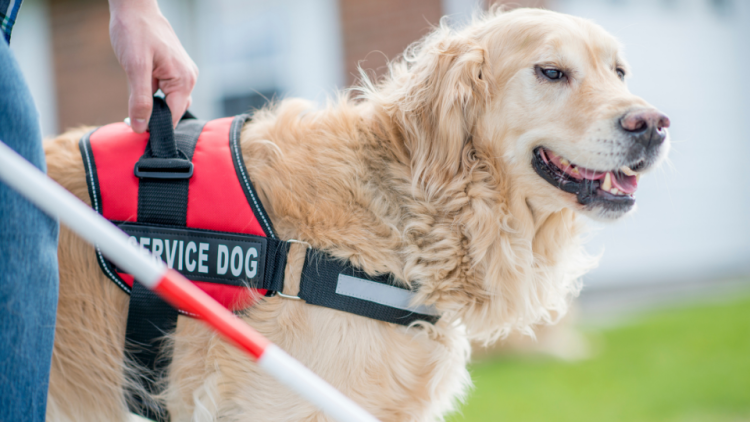Service dogs play a crucial role in the lives of people with disabilities. These loving animals are trained to help their owners perform day-to-day tasks, and some are specially trained for people with epilepsy, diabetes, or autism.
Shop Pet Insurance For Service Dogs
What Types Of Dog Insurance Do I Need?
However, just like regular dogs, service dogs can also get injured or sick and require veterinary care. That leaves owners with an important question: does insurance cover service dogs?
Service dog insurance is a great opportunity for owners to save money, as these dogs don’t come cheap. Additionally, if you have a disability that requires expensive medical bills, you will want to save wherever possible.
Here’s everything you need to know about insurance coverage for service dogs:
- Will health insurance pay for a service dog?
- How to pay for a service dog
- Will insurance cover a therapy dog?
- Will insurance cover service dog training?
- What service dog insurance coverage do I need?
- Key Takeaways
Will health insurance pay for a service dog?
No health insurance plan covers the cost of acquiring or maintaining a service dog. This is true for both Medicare and private health insurance. This means that people who could benefit from a service dog have to find alternative financing options.
Definition and cost of a service dog
Service dogs, also known as assistance dogs or helper dogs, are working animals that have been trained to assist people with disabilities. Because they require years of specialized training, service dogs can be quite expensive.
According to the National Service Animal Registry, a service dog costs between $17,000 and $40,000 to purchase, in addition to several thousands of dollars for food, supplies, and veterinary care.
The cost will depend on the provider as well as the type of service dog. For instance, psychiatric service dogs are usually less expensive than service dogs for visually impaired individuals. This is because these service dogs tend to require more effort and time to train.
How to pay for a service dog
Social Security Disability Income (SSDI)
If you qualify for the SSDI (Social Security Disability Insurance program), you’ll receive monthly payments, part of which you can use to cover some of the costs related to your service dogs, such as training and daily care. In some cases, SSDI also offers a lump sum option which you can put toward the initial cost of a service animal.
VHA Prosthetic and Sensory Aids Service (PSAS)
If you’re a veteran and you get paid via the US Department of Veterans Affairs (VA) you might be eligible for coverage for a service animal. VA does not provide service dogs but does provide this insurance benefit for eligible veterans through the Prosthetic and Sensory Aids Service (PSAS).

Will insurance cover a therapy dog?
Emotional support animals (ESAs) are not considered service dogs under the ADA. Unlike service dogs who are trained to perform a job that their owner cannot, emotional support dogs don’t need to be specifically trained. They provide relief to individuals with psychiatric disabilities through companionship. However, similar to service dogs, emotional support dogs are not covered by health insurance.
Will insurance cover service dog training?
Health insurance doesn’t provide coverage for training and other miscellaneous expenses related to service animals (equipment, vests, food, etc.). Service dogs' expenses can be deducted from your taxes and there are also other ways to defray costs.
Flexible Savings Account (FSA)
One option is to create a Flexible Savings Account (FSA), which enables savings free of tax. It should be noted though that you will need a letter of medical necessity (LMN) from your doctor in order to qualify.
Assistance Dog Special Allowance Program (ADSA)
The Assistance Dog Special Allowance (ADSA) Program provides a monthly government allowance for service dogs of $50 to eligible persons who use signal, guide, or service dogs. This allowance is intended to help pay the costs of grooming, food, and vet care for the animal.
Employer payment plans
People with disabilities can also use options for flexible payments provided by their employers. These payments make it possible for the employees to use pre-tax incomes to pay some costs related to their service animals. The disability must be documented, and the animal must be specifically trained to perform tasks or assist their owner with tasks they cannot do themselves. It should be noted that these flexible payment plans don’t cover emotional support dogs.
What service dog insurance coverage do I need?
There are several different types of dog insurance that you might consider getting for your service animal, considering how expensive they can be and how instrumental they are to your quality of life. Several examples include liability, life, and health insurance for service dogs, each of which we'll cover below.
Note: You'll also want to make sure you have auto insurance with dog injury protection if your disability does not restrict you from driving.
Service dog liability insurance
Service animals and emotional support animals receive the same coverage as any other pet under homeowners and renters insurance policies. If your animal were to accidentally hurt someone or damage property, your insurance provider will reimburse you to your policy’s pet liability coverage limit for any lawsuits and medical bills that arise from the injury.
Can insurance companies deny service dogs?
Yes, as mentioned before, service dogs receive the same coverage as any other dog, which means the same restrictions will apply, as well. The insurance company might refuse to cover your service dog if it belongs to a breed that is considered dangerous or aggressive (such as Pit Bull and Rottweiler).
Service dog life insurance
Pet life insurance is usually purchased for working animals that generate revenue, such as show dogs, as well as rare or valuable breeds like the French Bulldog. This type of insurance policy can also be a worthwhile investment in the case of service dogs due to the fact that they are expensive to train and may be impossible to replace without financial assistance.
How much does it cost to insure a dog?
Dog life insurance is typically quite expensive. The cost of monthly premiums will depend on the dog’s age, breed, location, level of benefit, and deductible amount, but generally ranges from $250 to $900 a year.
Pet health insurance for service dogs
Considering the fact that service dogs are a huge financial investment, it could be wise to protect your dog by insuring its health and your finances in the event of injury or illness. The benefits of service dog insurance include coverage for laboratory tests, illnesses, medications, emergency care, and more to ensure that your companion can continue to work by your side for as long as possible.
As mentioned before, the VA provides service dog health insurance benefit, but this is only eligible to veterans with disabilities that receive PSAS. Veterans with medically approved service animals are enrolled in a contracted veterinary health insurance policy to cover:
- Annual vet visits for routine and maintenance care, including screenings, immunization, dental cleanings, etc.
- Care for chronic conditions and/or disorders to enable the animal to perform its duties in service to the veteran
- Emergency care
- Prescription medications
Some providers, like Nationwide Pet Insurance, may even help replace your service dog with policy coverage once your companion passes away.
The good news is pet insurance doesn't cost any more for service dogs than typical pets. There’s a wide range of plans to choose from depending on your budget and priorities. Pawlicy Advisor is a tool that everyone can use to find the best health insurance plan for dogs, so they can enjoy a long, healthy life at your side.
Shop Pet Insurance For Service Dogs
Explore Pet Insurance Alternatives
Key Takeaways
- On average, service dogs cost between $17,000 and $40,000. Unfortunately, no health insurance option covers the cost of a service dog.
- Some alternative financing options that people with disabilities should consider include Social Security Disability Income (SSDI), VHA Prosthetic and Sensory Aids Service, Flexible Savings Account (FSA), Assistance Dog Special Allowance Program (ADSA), etc.
- When it comes to service dog insurance, owners can choose from liability insurance, life insurance, and pet health insurance. Which type of insurance you choose will depend on your dog’s, as well as your own needs.
